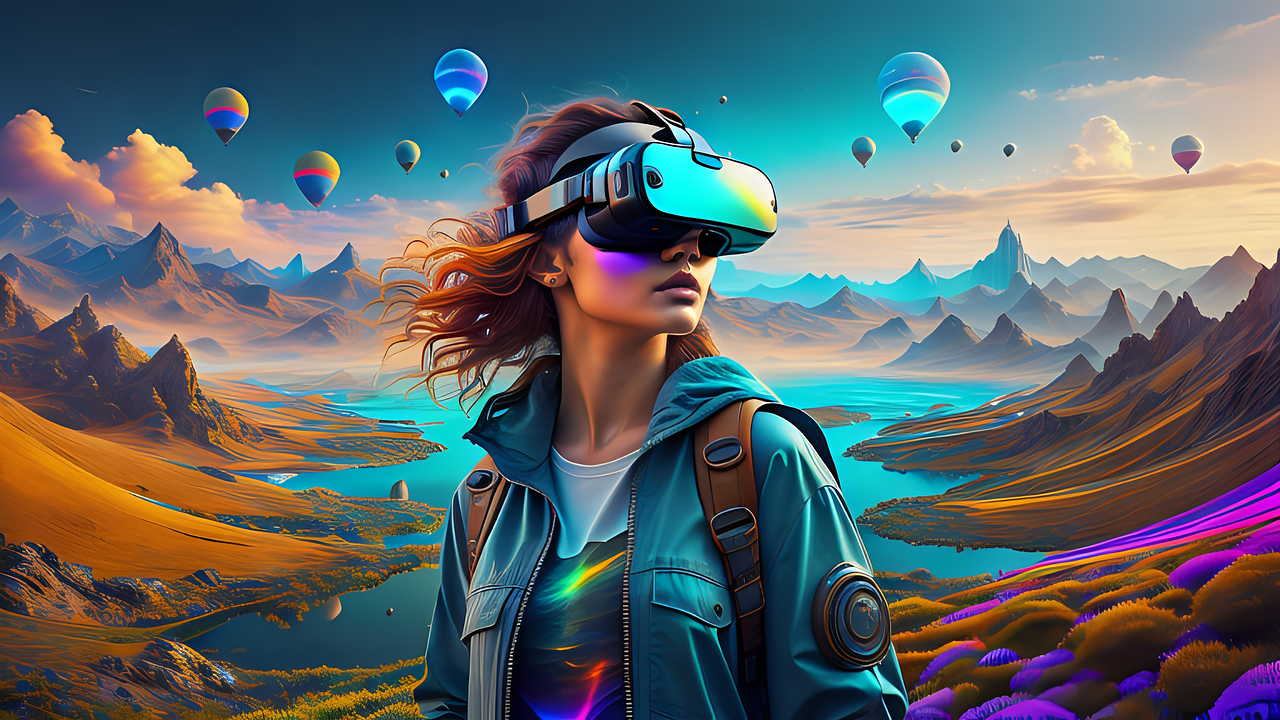The Metaverse: Exploring Its Concept, Potential, and Social Implications

The metaverse, a term popularized by science fiction and virtual reality enthusiasts, refers to a collective virtual shared space that encompasses multiple interconnected virtual worlds, augmented realities, and digital experiences. It represents a convergence of digital technologies, immersive environments, and social interactions, blurring the boundaries between physical and virtual realities. In this article, we delve into the concept of the metaverse, its potential applications across various domains, and the social and ethical implications that arise from its development and adoption.
Understanding the Metaverse: A Digital Universe of Infinite Possibilities
The metaverse encompasses a vast and interconnected digital universe where users can interact, create, explore, and collaborate in virtual environments. It transcends traditional boundaries of space and time, offering immersive experiences, persistent virtual worlds, and interconnected ecosystems of virtual assets, services, and communities.
Key elements of the metaverse include virtual reality (VR), augmented reality (AR), mixed reality (MR), immersive gaming environments, virtual economies, social platforms, and digital avatars that enable users to navigate, communicate, and engage with digital content and experiences.
Potential Applications of the Metaverse
The metaverse has the potential to impact various industries and domains, including:
- Entertainment and Gaming: Virtual worlds and immersive gaming experiences within the metaverse offer new avenues for entertainment, storytelling, and interactive gameplay. Virtual concerts, live events, and digital performances can attract global audiences and redefine entertainment experiences.
- Education and Training: The metaverse can revolutionize education and training by providing immersive learning environments, virtual classrooms, interactive simulations, and collaborative tools. Students can engage in hands-on experiences, simulations, and virtual field trips, enhancing learning outcomes and accessibility.
- Business and Commerce: Virtual marketplaces, digital economies, and virtual storefronts within the metaverse enable businesses to reach global audiences, showcase products and services, and engage with customers in immersive ways. Virtual meetings, conferences, and remote collaboration tools enhance productivity and connectivity in a distributed work environment.
- Healthcare and Wellness: Virtual healthcare solutions, telemedicine platforms, and immersive therapy sessions within the metaverse offer new opportunities for remote healthcare delivery, patient education, and mental health support. Virtual fitness experiences, wellness apps, and personalized health interventions promote well-being and accessibility to healthcare services.
- Social Interaction and Communities: The metaverse fosters social connections, online communities, and virtual gatherings where users can interact, socialize, and collaborate across geographic boundaries. Virtual social platforms, virtual events, and digital hangout spaces offer opportunities for social interaction, networking, and cultural exchange.
Social and Ethical Implications of the Metaverse
While the metaverse presents exciting possibilities, it also raises social and ethical considerations that require careful consideration:
- Digital Divide: Access to the metaverse and digital technologies may exacerbate existing inequalities and disparities, creating a digital divide based on socioeconomic factors, technological literacy, and access to high-speed internet and digital devices. Efforts to promote digital inclusion, accessibility, and equitable access to the metaverse are essential.
- Privacy and Data Security: The collection, storage, and use of user data within the metaverse raise concerns about privacy, data security, and user consent. Safeguarding personal information, data encryption, transparency in data practices, and user-controlled privacy settings are critical to protecting user rights and maintaining trust in virtual environments.
- Virtual Identity and Representation: Digital avatars, virtual identities, and online personas in the metaverse raise questions about identity, representation, and authenticity. Ensuring diversity, inclusion, and respectful behavior in virtual communities, combating harassment and discrimination, and promoting positive digital interactions are vital for fostering a welcoming and inclusive metaverse environment.
- Ethical Use of AI and Automation: AI-driven algorithms, automation, and virtual assistants within the metaverse raise ethical considerations related to algorithmic bias, accountability, and unintended consequences. Ethical guidelines, responsible AI practices, and human oversight are necessary to mitigate risks and ensure ethical use of AI technologies in virtual environments.
- Content Moderation and Digital Governance: Managing content, enforcing community guidelines, and addressing misinformation, hate speech, and harmful content in the metaverse require robust content moderation policies, transparent governance frameworks, and mechanisms for user reporting and dispute resolution.
Conclusion: Navigating the Future of the Metaverse
In conclusion, the metaverse represents a transformative frontier in digital innovation, offering immersive experiences, collaborative environments, and new possibilities for creativity, connectivity, and economic growth. Its potential applications span entertainment, education, business, healthcare, and social interaction, shaping the way we work, learn, play, and connect in the digital age.
As we navigate the evolution of the metaverse, addressing social, ethical, and regulatory challenges is paramount to ensure a safe, inclusive, and responsible virtual environment. Collaborative efforts among stakeholders, including technology companies, policymakers, researchers, and users, are essential to harnessing the full potential of the metaverse while upholding principles of privacy, security, inclusivity, and ethical use of digital technologies. By fostering a thoughtful and sustainable approach to the metaverse, we can create a digital future that empowers individuals, fosters creativity, and promotes positive social impact in virtual worlds and beyond.
Similar Post You May Like
-

CFCs, HFCs and their long, troubled history
At its peak, the ozone hole covered an area 7 times larger than the size of Europe, around 29.9 million km2, and was rapidly expanding
-

The Origin of Universe: Deciding point where it all began!
Let us unravel and surf through the ideas throughout ages to understand what the universe and its origin itself was to its inhabitants across history.
-

The Artemis Program
Inspired by the Greek goddess of the Moon, twin sister to Apollo, the artimis program was named on 14 May 2019 by Jim Bridenstine.







